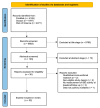Psychopharmacological Therapy Positively Modulates Disease Activity in Inflammatory Bowel Disease: A Systematic Review
- PMID: 40650291
- PMCID: PMC12249696
- DOI: 10.3390/ijms26136514
Psychopharmacological Therapy Positively Modulates Disease Activity in Inflammatory Bowel Disease: A Systematic Review
Abstract
Depression, anxiety, and perceived stress are common comorbidities in patients with inflammatory bowel disease (IBD) and may negatively influence the disease course. Likewise, severe IBD may contribute to the development or worsening of psychiatric symptoms. Despite the established relevance of the gut-brain axis and frequent use of psychotropic medications in IBD patients, limited evidence exists regarding the effects of psychiatric treatments on gastrointestinal disease activity. Therefore, the aim of this systematic review is to evaluate the effectiveness of psychiatric therapies on gastrointestinal symptoms and disease activity in patients with IBD. The work was conducted in accordance with PRISMA guidelines. Searches were performed across PubMed, Web of Science, and Scopus up to July 2024. Eligible studies evaluated the effectiveness of psychiatric medications-including antidepressants, antipsychotics, anxiolytics, sedative-hypnotics, mood stabilizers, anticonvulsants, and others-on at least one gastrointestinal outcome in patients with IBD. Outcomes included changes in commonly used clinical and endoscopic scores for Crohn's disease (CD) and ulcerative colitis (UC), number of bowel movements, stool consistency, presence of blood in stool, severity of abdominal pain, as well as in surrogate markers of disease activity following treatment. Out of 8513 initially identified articles, 22 studies involving 45,572 IBD patients met the inclusion criteria. Antidepressants, particularly bupropion, tricyclic antidepressants, selective serotonin reuptake inhibitors (SSRIs), venlafaxine, and duloxetine, were associated with improvements in IBD activity scores, including Crohn's Disease Activity Index (CDAI) and Simple Endoscopic Score for Crohn's Disease (SES-CD) for CD, Mayo score and Ulcerative Colitis Endoscopic Index of Severity (UCEIS) for UC. Case reports highlighted potential benefits of pregabalin and lithium carbonate, respectively, showed by the reduction in clinical and endoscopic score of disease activity for pregabalin and improvement of UC symptoms for lithium carbonate, while topiramate showed limited efficacy. Clonidine and naltrexone determined the reductions in clinical and endoscopic score of disease activity, including CDAI and Crohn's disease endoscopy index severity score (CDEIS) for CD and Disease Activity Index (DAI) for UC. Despite the limited data and study heterogeneity, antidepressants, naltrexone, and clonidine were associated with improvements in IBD activity. Larger, prospective studies are needed to confirm the therapeutic potential of psychiatric medications in modulating IBD activity and to guide integrated clinical management.
Keywords: antidepressants; disease activity; gut–brain axis; inflammatory bowel disease; psychiatric medications.
Conflict of interest statement
The authors declare no conflicts of interest.
Figures



References
-
- Roderburg C., Yaqubi K., Konrad M., May P., Luedde T., Kostev K., Loosen S.H. Association between inflammatory bowel disease and subsequent depression or anxiety disorders—A retrospective cohort study of 31,728 outpatients. J. Psychiatr. Res. 2024;169:231–237. doi: 10.1016/j.jpsychires.2023.11.026. - DOI - PubMed
-
- Bernstein C.N., Fisk J.D., Dolovich C., Hitchon C.A., Graff L.A., El-Gabalawy R., Lix L.M., Bolton J.M., Patten S.B., Marrie R.A. Understanding Predictors of Fatigue Over Time in Persons With Inflammatory Bowel Disease: The Importance of Depressive and Anxiety Symptoms. Am. J. Gastroenterol. 2024;119:922–929. doi: 10.14309/ajg.0000000000002630. - DOI - PubMed
Publication types
MeSH terms
Substances
LinkOut - more resources
Full Text Sources
Miscellaneous

